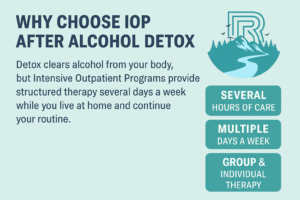You made it through detox. On paper, that’s a win. You’re still working, still paying bills, still showing up where you’re supposed to. You tell people you’re “fine.” And most of them believe you.
But you know detox was only the start. That edge of exhaustion hasn’t gone away—it’s just quieter. You’ve been holding it together in public for so long that letting it unravel, even in a safe place, feels foreign.
This is where an Intensive Outpatient Program in Middletown, Ohio can become the bridge between surviving and actually living.
The Detox High-Wire Act
Detox clears alcohol from your body, but it doesn’t erase the mental and emotional patterns that kept you drinking. It’s like being dropped off halfway across a tightrope—yes, you’ve made it partway, but there’s no net and a long way to go.
For high-functioning people, this stage is tricky. You’re skilled at keeping the plates spinning, even when your internal life feels like chaos. That can make it easy to downplay the need for more help.
But the truth is, going back into your full routine without extra support often means those old stress patterns slide right back in—sometimes faster than you expect.
Why High-Functioning Makes Recovery Harder (and Easier)
Being high-functioning comes with mixed blessings. On one hand, you’re used to responsibility and can juggle multiple priorities. Those skills will help in recovery. On the other hand, you’re used to being the person others rely on—which means you’re good at hiding your own struggles.
In detox, you probably heard at least one person say, “I had no idea you were drinking that much.” That’s not a compliment. It’s proof that your ability to mask has been working against you.
In IOP, you don’t have to mask. You don’t have to perform. That’s a different kind of work, and it’s often the most freeing part.
Balancing Recovery and Real Life
You’ve worked too hard to throw your life into chaos. That’s one reason IOP exists—to fit recovery into a life that’s still in motion.
An Intensive Outpatient Program offers structured therapy multiple days a week, but you can still live at home, keep your job, and be present for your family. The schedule flexes around your life instead of forcing you to abandon it.
If you’re looking for Intensive Outpatient Program in West Chester, Ohio or nearby, you can have the benefits of daily structure without uprooting your entire routine.
What Makes IOP Different From Just Therapy
One therapy session a week can be helpful—but it’s often not enough for someone used to pushing through and keeping struggles private.
IOP gives you:
- Frequency: Several hours of care, multiple days a week
- Depth: Group and individual therapy combined
- Connection: A room full of people who understand what it’s like to look “fine” on the outside while wrestling with more underneath
- Skills: Practical tools you practice, not just hear about
It’s the difference between learning to swim from a book and actually getting in the water with an instructor next to you.

Turning Private Exhaustion Into Public Support
One of the hardest things about being high-functioning is that people rarely realize you need help. You’re the reliable one, the fixer, the person who gets it done.
In IOP, you can drop that act. You can say “I’m tired” and have someone actually hear you. You can admit you’re struggling without someone offering surface-level advice like “just take a weekend off.”
That shift—from holding it all in to letting it out—is often where the real recovery work begins.
Preparing for the Triggers You’ll Actually Face
Life after alochol detox isn’t a bubble. The same triggers you had before—social drinking invites, work stress, late-night loneliness—are still there.
In IOP, you identify those triggers and develop concrete strategies before you’re standing in front of them. That might mean learning how to decline a drink without awkwardness, building a nightly wind-down ritual that doesn’t involve alcohol, or knowing exactly who to text when the urge hits.
The goal isn’t to avoid your life—it’s to navigate it with more stability.
Why It’s a Step Forward, Not a Step Back
For some, going into treatment after detox feels like admitting weakness. The truth? It’s the opposite. Choosing IOP shows you value your independence enough to protect it.
You’re not stepping away from life—you’re creating the conditions to keep showing up for it in a way that doesn’t destroy you in the process.
A Real Story From a High-Functioning Client
One client came to us right after detox. On the outside, he had it all: a strong career, a marriage, and no visible fallout from his drinking. But every night, he drank alone after the kids went to bed.
He told us, “I didn’t think I needed more than detox. But after a week back at work, I could feel the pull. IOP was the thing that kept me from slipping back quietly.”
By the time he finished the program, he’d rebuilt his coping skills, had strategies for high-stress work days, and—most importantly—was honest with at least one person in his life about his struggles.
FAQs About Moving From Detox to IOP
Do I need IOP if I already completed detox?
Yes, detox only addresses the physical withdrawal from alcohol. IOP addresses the mental, emotional, and behavioral changes needed to maintain sobriety.
Will I have to tell my employer I’m in IOP?
Not necessarily. Many IOP schedules are flexible enough to fit around work hours, and you have the right to keep your medical treatment private.
Can I do IOP while working full-time?
Yes. Programs are designed for people with ongoing responsibilities, offering evening or flexible scheduling options.
What’s the difference between IOP and inpatient rehab?
Inpatient rehab requires living at a facility full-time. IOP allows you to live at home and continue daily life while receiving several hours of structured therapy each week.
What if I relapse during IOP?
You won’t be kicked out. Relapse is addressed as part of the process, and the focus will be on learning from it and adjusting your plan.
Is IOP only for people in crisis?
No. Many high-functioning individuals choose IOP as a proactive step after detox to reinforce recovery before problems escalate.
Why This Transition Matters
Detox is a reset button, not the full program. Without follow-up care, it’s like stopping antibiotics halfway through—you might feel better for a while, but the underlying problem is still there.
IOP bridges that gap. It gives you time to heal, plan, and strengthen yourself while still living your life. For high-functioning people, it’s a way to keep moving forward without pretending you’re fine when you’re not.
You Don’t Have to Keep Doing This Alone
Detox got you out of crisis. IOP can keep you moving forward.
Call (888) 905-6281 to learn more about our Intensive Outpatient Program services in Middletown, Ohio. You’ve carried enough on your own—it’s time for a different kind of strength.




























